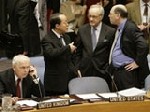 Almotamar.net
Almotamar.net - March 24 (Bloomberg) -- The United Nations Security Council voted unanimously for a resolution freezing the assets of a state-owned Iranian bank and imposing penalties on some military commanders, to push Iran to suspend its nuclear program.
The resolution, which toughens sanctions approved in December, gives Iran 60 days to suspend uranium enrichment before the new penalties are imposed. If Iran continues to resist UN demands, more economic penalties could be levied.
Acting U.S. Ambassador Alejandro Wolff said the vote ``sends a clear and unambiguous message to Iran'' that pursuing a nuclear weapons capability ``will only further isolate Iran and make it less, not more secure.''
Iran has defied two UN resolutions demanding a halt to enrichment, which the U.S. and European governments suspect is part of nuclear-weapons development effort. Iran says it is pursuing an atomic program to meet future domestic electricity demand, and doesn't seek a nuclear bomb.
Iranian Foreign Minister Manouchehr Mottaki said at the UN after the vote that the Security Council ``is being abused to take an unlawful, unnecessary and unjustifiable action'' against what he described as a ``completely peaceful'' nuclear program.
Mottaki said the Security Council resolutions ``cannot indicate universal acceptance'' because of support Iran has gotten from governments of the ``non-aligned'' movement and from Islamic countries.
While Qatari Ambassador Nassir al-Nasser said before the vote that sanctions might ``signify another failure of diplomatic efforts,'' his country -- the only Arab member on the council -- joined 14 other countries in backing the resolution.
Revolutionary Guard
The resolution targets an arm of Iran's military, the Revolutionary Guard Corps, by freezing the assets of its top commanders and asking countries to show restraint in allowing them to travel abroad. Companies identified as having ties to the Iranian nuclear or ballistic-missile program, along with scientists connected to the effort, also are sanctioned under the measure.
For days before the vote, Iranian leaders have spoken out against the UN for adding more pressure on their government. Iranian President Mahmoud Ahmadinejad had planned to speak at the council session before the vote, then canceled his trip. Iran said yesterday the U.S. didn't issue enough visas for his delegation, an accusation denied by the State Department.
Sailors Held
The Security Council vote took place one day after Iran detained 15 British sailors and marines who allegedly entered Iranian waters. The military personnel today were taken to Tehran. Wolff said yesterday the dispute was a ``separate incident'' that didn't affect the sanctions resolution negotiations.
Under the UN resolution, countries are asked ``to exercise vigilance and restraint'' in the supply, sale or transfer of weapons to Iran and to deny Iran training or financial assistance that would be used to procure weapons.
The UN measure asks all nations and international lenders such as the World Bank to stop giving any grants, loans and other financial aid to Iran, except for humanitarian or development purposes. Iran's main source of economic wealth is oil exports; the country is the second biggest producer in the Middle East.
The U.S. Treasury on Jan. 9 blocked Bank Sepah, the state- owned Iranian bank, from accessing the American financial system, accusing it of aiding Iran's weapons programs.
If Iran refuses the UN demands about its nuclear work, the Security Council could move to discussions under Article 41 of the UN Charter, which provides for unspecified economic penalties.
`Good Faith'
Should the UN's International Atomic Energy Agency find that Iran halted its uranium enrichment and reprocessing work, the Security Council would suspend implementation of sanctions to allow negotiations to be carried out ``in good faith,'' according to the resolution.
The resolution refers to a U.S.-backed package of incentives drafted by the European Union, which includes the lifting of some U.S. sanctions as well as access to light-water nuclear reactors. That offer was formally presented to Iran last June by the Security Council's five permanent members -- the U.S., U.K., France, Russia and China -- plus Germany.
The co-sponsors of the resolution, France, Germany and the U.K., in week-long negotiations rejected a number of proposed amendments by council members Qatar, Indonesia and the current council president, South Africa. Those proposals included a 90- day freeze in imposing sanctions.
U.K. Ambassador Emyr Jones Parry said a freeze would reward Iran's defiance of international demands that it suspend nuclear work.
To contact the reporter on this story: Todd Zeranski at the United Nations at tzeranski@bloomberg.net

